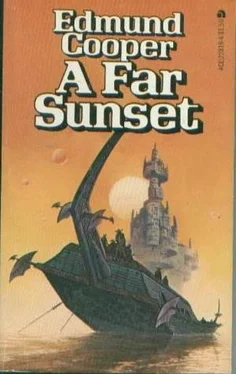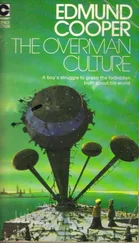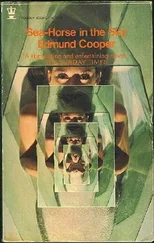After Zu Shan and Nemo there came Bai Lut, a one-armed youth whose right arm had been struck off for persistent stealing. And after Bai Lut there was Tsong Tsong, who had been fished out of the Mirror of Oruri, more dead than alive and who could not or would not remember anything of his past—though, at the age of perhaps eleven, he could not have had much past to remember.
And that was the entire complement of the Paul Marlowe Extra-Terrestrial Academy for Young Gentlemen.
As he paced up and down the room, while the small night lamp sent up thin desultory spirals of smoke, Paul thought of his school and of his achievements—or lack of them. He thought of the many hours he had spent simply trying to teach that the earth was round and not flat. He thought of the seemingly endless number of dried kappa leaves he had covered with charcoal scrawl, trying to demonstrate that it was possible to record words in the form of writing. He had modified some of the conventional sounds of the letters in the Roman alphabet to accommodate the Bayani tongue and he had stuck to a more or less phonetic form of writing.
But, with the exception of little Nemo, who was just about capable of writing his own name and those of his companions, no one seemed to grasp that it was possible to assign a logical sequence of meanings to a few marks on some dried kappa leaves. Or that even if it were, the operation could have any conceivable use other than the gratification of Poul Mer Lo.
On more practical and amusing levels, however, there had been more successes. Zu Shan had developed a flair for building small gliders, Bai Lut was good at making kites, and Tsong Tsong had—with some help—fashioned a successful model windmill which he used, oddly enough, to power a fan.
The boys seemed fascinated by the idea of harnessing the wind. It was something they could understand. Perhaps in the end, thought Paul, he would achieve a transient immortality by introducing the wheel and the use of wind power to the inhabitants of Baya Nor.
But what else could he do? What else was he equipped to do?
He did not know. Nor did he know whether the new godking was really ignoring him or merely waiting for the stranger, who had enjoyed the favour of his predecessor, to commit some offence that would justify his permanent removal.
The uncertainty by itself did not worry him too much. What did worry him was his own feeling of inadequacy, his growing mood of futility and, above all, his isolation. He had begun to think more and more of Earth. He had begun to live more and more in the past. He dreamed of Earth, he day-dreamed of Earth, he longed to be back on Earth.
If he couldn’t develop some kind of mental discipline to shut Earth away in a tiny compartment of his mind, he would presently go quite crazy. And that would be the saddest joke of all—one demented psychiatrist, the sole survivor of the expedition to Altair Five.
Mylai Tui groaned in her sleep. He stopped pacing up and down and decided that he would try to get some sleep himself. He glanced at her in the dim light and noted vaguely that she was getting rather fat. Then he lay down by her side and closed his eyes.
He still could not sleep. Visions of Earth kept drifting into his mind. He tried to concentrate on the school and calculate how long it would take to build with the help of four boys, two of whom were crippled.
Long enough, perhaps, to bring Enka Ne the 610th to the stone of sacrifice. Or Poul Mer Lo to a state of melancholic withdrawal from which there would be no return.
He let his arm rest lightly on Mylai Tui, feeling the soft warm flesh of her breast rise and fall rhythmically. It gave him no comfort. He was still staring blankly at the mud-cemented thatch of the ceiling when dawn came.
Two workmen had just delivered a load of rough-hewn wood for strengthening the framework of the small school. Poul Mer Lo noted with satisfaction that the wood had been brought on a four-wheeled cart complete with a two-man harness. He also noted with even greater satisfaction that the small Bayanis took their cart very much for granted. They might have been accustomed to using such vehicles for years instead of only for a matter of months. Poul Mer Lo—and this was one of the days when he did not think it was such a bad thin g to be Poul Mer Lo, the teacher—wondered how long it would be before some Bayani genius decided that the front pair of wheels, their axle linked to a guiding shaft, would be more efficiently employed if they could swing on a vertical pivot.
But perhaps a vertical pivot and guiding mechanism for the front axle-tree was as yet too revolutionary a concept—as revolutionary as differential gears might have been to an eighteenth-century European coach-builder. Perhaps it would require a few more generations before the Bayani themselves added refinements to the new method of transport that had been introduced by the stranger. Certainly, Poul Mer Lo decided, he would not present them with the device himself. It would be a mistake not to let the Bayani do some of their own discovering.
It was a warm, sunny morning. When they had unloaded their wood, the workmen rested a while, wiped the sweat from their foreheads and regarded with obvious amusement the crazy structure that was being built by two boys and two cripples. Poul Mer Lo gave them the copper ring he had promised, and there was much exchange of courtesies.
Then one of them said somewhat diffidently: ‘Lord, what is this thing that you cause these lost ones to raise? Is it, perhaps,
to be a temple for the gods of your own country?’
‘It is not to be a temple,’ explained Poul Mer Lo, ‘but a school.’ There was no word for school in the Bayani language so he simply introduced the English word.
‘A sku-ell?’
‘That is right,’ answered Poul Mer Lo gravely. ‘A school.’ ‘Then for what purpose, lord, is this sku-ell to be raised?’
‘It is to be a place where children come to learn new skills.’ The Bayani scratched his head and thought deeply. ‘Lord, does not the son of a hunter learn to hunt and the son of a carver learn to carve?’
‘That is so.’
‘Then, lord, you do not need this sku-ell,’ said the Bayani triumphantly, ‘for the young learn by watching the old, such is the nature of life.’
‘That is true,’ said Poul Mer Lo. ‘But consider. These are children now without fathers. Also the skills that they shall learn shall be skills such as their fathers have not known.’
The Bayani was puzzled. ‘It is known that lost ones are the beloved of Oruri, from whom they will receive that which they are destined to receive … Also, lord, may not new skills be dangerous?’
‘New skills may indeed be dangerous,’ agreed Poul Mer Lo, ‘but so also may old skills be dangerous. The school is where— with the blessing of Oruri—these lost ones may perhaps gather some small wisdom.’
The Bayani was baffled, but he said politely: ‘Wisdom is good to have, lord—but surely Enka Ne is the source of wisdom?’
‘Without doubt, Enka Ne is the greatest source of wisdom in Baya Nor,’ said Poul Mer Lo carefully, ‘but it is good, is it not, that lesser beings should endeavour to achieve wisdom?’ The Bayani urinated on the spot. ‘Lord, these matters are too great for poor men to consider … Oruri be with you.’ He signalled to his companion, and they picked up the harness of the cart.
‘Oruri be with you always,’ responded Poul Mer Lo, ‘at the end as at the beginning.’
He watched them as they trundled the cart back along the Road of Travail towards the Third Avenue of the Gods.
For a while he supervised the stacking of the timber. Then, because the day was hot, he sat down to rest in the shadow of the small patch of roofing already on top of the school house.
Читать дальше












